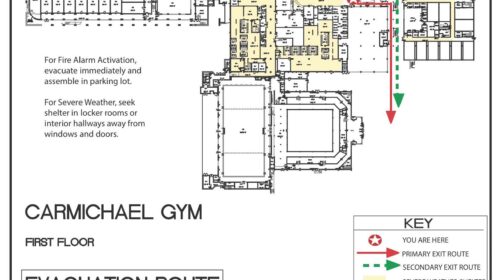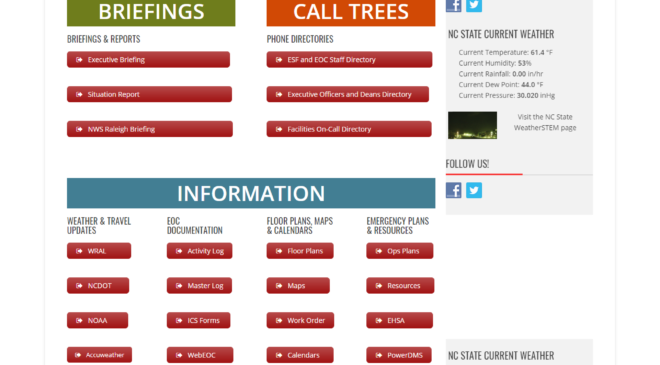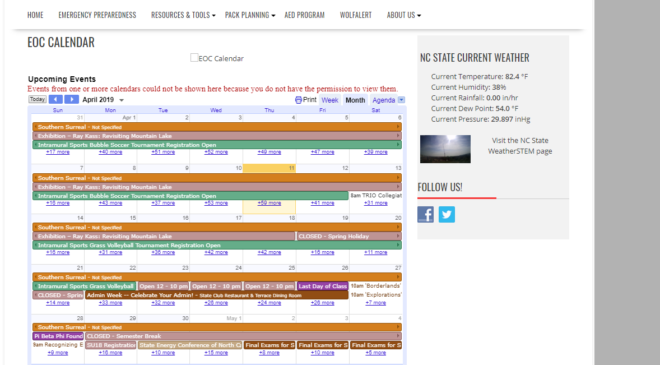Awards and Recognition
Emergency Management & Mission Continuity Milestones
2023
Campaign Award – Back to Basics Emergency Preparedness, CSHEMA
After nearly three years of unplanned events and operation impacts, NC State decided to revisit the basics of emergency preparedness on campus. This campaign includes hard print posters, social media postings, electronic billboard updates and more. WIth 12 topics, the team delivered a grassroots effort of review and familiarity.
For the full press release, read more!
2022
Football Game Day Operations – Campus, Safety, Health, Environmental Management Association: Process Improvement Innovation Award
North Carolina State’s Emergency Preparedness and Strategic Initiatives was tasked to respond to inevitable operational impacts on campus events during COVID 19 in 2021. Formulating plans to coordinate services centrally, manage safety and security operations in a shared approach both virtually and in-person was the goal. Operationalizing existing emergency preparedness and venue plans was the first step. The second step was centralizing all components of safety, security and athletics game day operations into one platform, for ease of information collection and ready access for responders.
For the complete list of CSHEMA award winners, read more!
Year of Pivots – Preparedness in Uncertain Times; Campus, Safety, Health, Environmental Management Association: Marketing Campaign Award
The campaign targets an academic year (between August and May) embroiled by COVID-19 impacts, shining a spotlight on the basics of emergency preparedness – despite the pandemic. With COVID-19, the pandemic solidified making an emergency event very real, very impactful and very personal to everyone. Pairing real events associated with the pandemic to campus preparedness topics, this campaign was eye-catching and quippy. Using catchy imagery and levity, each poster provided a nugget of information, with visually appealing high impact colors. This has made a HUGE difference in refreshing some of the emergency preparedness basics.
2021
- Campus Safety, Health and Environmental Management Association recognized NC State with two awards –
- 2021 Innovation Award for Resource Enhancement recognizing EMMC Pack Planning use of staffing models and COVID testing programs.
- 2021 Marketing & Communications Campaign Award recognizing joint marketing partnerships by EMMC and Campus Enterprises throughout the pandemic.
2020
Are you PACKReady – Comprehensive Personal Preparedness – International Association of Emergency Management Public Awareness Campaign Award
 Macro-level emergency planning and mission continuity emphasizes holistic planning and communications for an institution. In 2018, honing this message incorporated personal preparedness on a micro-level, as a component of truly comprehensive messaging. NC State’s existing macro level campaigns were widely identifiable as PACKReady, this campaign was dubbed “Are You PACK Ready?” to reach individuals. This public awareness campaign was developed as a comprehensive personal emergency preparedness program, with the outreach material supporting emergency management and mission continuity awareness on the individual level. Program origin was predicated on the need convince or remind stakeholders that unplanned events impact everyone, anywhere.
Macro-level emergency planning and mission continuity emphasizes holistic planning and communications for an institution. In 2018, honing this message incorporated personal preparedness on a micro-level, as a component of truly comprehensive messaging. NC State’s existing macro level campaigns were widely identifiable as PACKReady, this campaign was dubbed “Are You PACK Ready?” to reach individuals. This public awareness campaign was developed as a comprehensive personal emergency preparedness program, with the outreach material supporting emergency management and mission continuity awareness on the individual level. Program origin was predicated on the need convince or remind stakeholders that unplanned events impact everyone, anywhere.
2019
Innovation Award for Virtualization of an Emergency Operations Center – CSHEMA Award
 EMMC was charged with the goal to improve institutional emergency planning and continuity by expanding planning outreach and to fortify university preparedness and response. While the impact of an emergency or disruption is unpredictable, planning for such conditions can largely mitigate the effects to our facilities’ operations and allow us to continue our fulfillment of the university’s mission. It is crucial NC State respond to a disaster or a major disruption of operations in a manner that ensures vital and essential functions continue with minimum interference. The nature and scope of events that require emergency assistance has grown, in both natural and man-made events. In large scale events, a physical emergency operations center (EOC) is opened near the event, to coordinate services in a mutually shared physical capacity. However, not all disasters allow for a physical EOC, thus using a virtual EOC (vEOC) option emulates and/or extends a physical EOC operation. Off the shelf or vendor developed emergency management software of this nature is very costly and requires extensive training, permissions and infrastructure to support. NC State identified a need for a vEOC but in a cost effective, user friendly and University compliant option. Using two student interns and enterprise accessible software options, EMMC built a vEOC and rolled it out in spring 2019.
EMMC was charged with the goal to improve institutional emergency planning and continuity by expanding planning outreach and to fortify university preparedness and response. While the impact of an emergency or disruption is unpredictable, planning for such conditions can largely mitigate the effects to our facilities’ operations and allow us to continue our fulfillment of the university’s mission. It is crucial NC State respond to a disaster or a major disruption of operations in a manner that ensures vital and essential functions continue with minimum interference. The nature and scope of events that require emergency assistance has grown, in both natural and man-made events. In large scale events, a physical emergency operations center (EOC) is opened near the event, to coordinate services in a mutually shared physical capacity. However, not all disasters allow for a physical EOC, thus using a virtual EOC (vEOC) option emulates and/or extends a physical EOC operation. Off the shelf or vendor developed emergency management software of this nature is very costly and requires extensive training, permissions and infrastructure to support. NC State identified a need for a vEOC but in a cost effective, user friendly and University compliant option. Using two student interns and enterprise accessible software options, EMMC built a vEOC and rolled it out in spring 2019.
Innovation Award for Special Event Calendaring – Collating Campus-Wide Special Events Information for Emergency Communications and Planning
Program Overview
 Having a holistic understanding of NC State campus operations and events empowers in-depth and more effective emergency planning and response. Special events, outside the scope of normal operations associated with daily activities of campus, vastly increases people on campus, the need for additional resources and operation support. In the event of an emergency, knowing what events are occurring, where, the approximate attendance is helpful for communications and response actions. Emergency Management and Mission Continuity (EMMC) Department is tasked with continuous improvement of institutional emergency planning and continuity through expanded planning. Collating information on special events across campus is needed to really approach holistic communications to visitors, minors, alumni, contractors and others. EMMC uses Google Calendar as the basis of the emergency planning and communication special events calendar. The calendar is populated either by direct iCal feeds from other Google Calendars on campus or by using a third party software to automatically pull event information from websites, social media and other sources (Zapier).
Having a holistic understanding of NC State campus operations and events empowers in-depth and more effective emergency planning and response. Special events, outside the scope of normal operations associated with daily activities of campus, vastly increases people on campus, the need for additional resources and operation support. In the event of an emergency, knowing what events are occurring, where, the approximate attendance is helpful for communications and response actions. Emergency Management and Mission Continuity (EMMC) Department is tasked with continuous improvement of institutional emergency planning and continuity through expanded planning. Collating information on special events across campus is needed to really approach holistic communications to visitors, minors, alumni, contractors and others. EMMC uses Google Calendar as the basis of the emergency planning and communication special events calendar. The calendar is populated either by direct iCal feeds from other Google Calendars on campus or by using a third party software to automatically pull event information from websites, social media and other sources (Zapier).
 Emergency planning is big, time consuming and overwhelming for planners, even seasoned planners. A comprehensive plan consists of six chapters that requires approximately 50 hours to complete. The “Year of Planning” Campaign was identified as an option for small, digestible chunks of planning activity that units could tackle in small amount of time. This allows for focused work and completion and planners feel like progress is being made in small contributions. This has made a HUGE difference in plan completions and information updates. Planners are happier with the perception of less work and bigger completion milestones.
Emergency planning is big, time consuming and overwhelming for planners, even seasoned planners. A comprehensive plan consists of six chapters that requires approximately 50 hours to complete. The “Year of Planning” Campaign was identified as an option for small, digestible chunks of planning activity that units could tackle in small amount of time. This allows for focused work and completion and planners feel like progress is being made in small contributions. This has made a HUGE difference in plan completions and information updates. Planners are happier with the perception of less work and bigger completion milestones.
2018
Innovation Award of Excellence – PACK Ready Emergency Plans
Prior to 2016, Business Continuity Plans existed for 120 critical services, departments and academic units. These plans provided for the continuance of critical processes in the event an emergency thwarts facility operations, access to information technology resources or infrastructure, and/or the university experiences a long term power-outage. Emergency Management, as part of a reorganization effort, transformed these plans -now referred to as Pack Ready Plans -expanded to include a comprehensive risk assessment of possible impacts to NC State University. Potential risks identified are used to develop unit-specific plans to assist the university fulfill its mission and to define procedures in place that reduce exposure to these vulnerabilities/threats, as well as evaluate their probability of occurrence. Pack Ready Plans live in Google Shared Drive for accessibility.
2017
Institutional Marketing Campaign Award of Excellence for PACK Ready Outreach Campaign
NC State’s Emergency Management and Mission Continuity department recently won the Campus, Safety, Health and Environmental Management Association (CSHEMA) institutional marketing campaign Award of Excellence for its PACK Ready Outreach Campaign.
The NC State campaign, which began in 2017, addresses comprehensive emergency planning, response and recovery for campus units, from personal preparedness to IT and natural and man-made disasters. This planning effort impacts students, faculty and staff as part of the campus Emergency Operations Plan and incorporates academic and research continuity and specialized planning efforts for specific events.